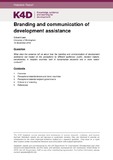| dc.contributor.author | Laws, Edward | |
| dc.date.accessioned | 2017-10-12T11:23:51Z | |
| dc.date.available | 2017-10-12T11:23:51Z | |
| dc.date.issued | 2016-11-16 | |
| dc.identifier.citation | Laws, E. (2016). Branding and communication of development assistance (K4D Helpdesk Research Report). Birmingham, UK: GSDRC, University of Birmingham. | en |
| dc.identifier.uri | https://opendocs.ids.ac.uk/opendocs/handle/20.500.12413/13277 | |
| dc.description.abstract | In recent years, international donors and non-governmental organisations have placed increasing emphasis on prominently branding the development interventions that they fund. Spreading knowledge about the identity of an aid project sponsor is one mechanism by which donor governments conduct local level diplomacy with direct beneficiaries and through which they hope to influence public opinion. The most common method of spreading information about the sponsorship of development interventions is through visual branding . Though branding has been part of U.S. aid policy since the Foreign Assistance Act of 1961, the emphasis on this foreign policy tool has increased as part of the post-9/11 National Security Strategy. Other donor countries, such as the United Kingdom, have followed suit with their own branding policies.
Although there is a broad assumption that branding improves attitudes toward the donor amongst the recipients of foreign assistance, very little rigorous evidence has been collected to verify this, and the size of the potential effect of branding on recipient attitudes is unknown. In addition, little is know about whether donor’s branding strategies effectively communicate that the foreign donor acts as sponsor of a given intervention. Most of the empirical work that examines the impact of aid on public perceptions takes the form of in-country case studies. The literature appears to focus exclusively on USAID programmes. This includes studies focusing on U.S. ‘hearts and minds’ campaigns in conflict zones, as well as studies focusing on disaster relief aid. | en |
| dc.language.iso | en | en |
| dc.publisher | Institute of Development Studies | en |
| dc.relation.ispartofseries | K4D Helpdesk Report; | |
| dc.rights.uri | https://www.nationalarchives.gov.uk/doc/open-government-licence/version/3/ | en |
| dc.subject | Aid | en |
| dc.title | Branding and communication of development assistance | en |
| dc.type | Helpdesk | en |
| dc.rights.holder | DFID | en |
| dcterms.dateAccepted | 2016-11-16 | |
| rioxxterms.funder | Default funder | en |
| rioxxterms.identifier.project | K4D | en |
| rioxxterms.version | NA | en |
| rioxxterms.funder.project | 0986883a-6d0f-4bb8-9c46-5e0682934d65 | en |

